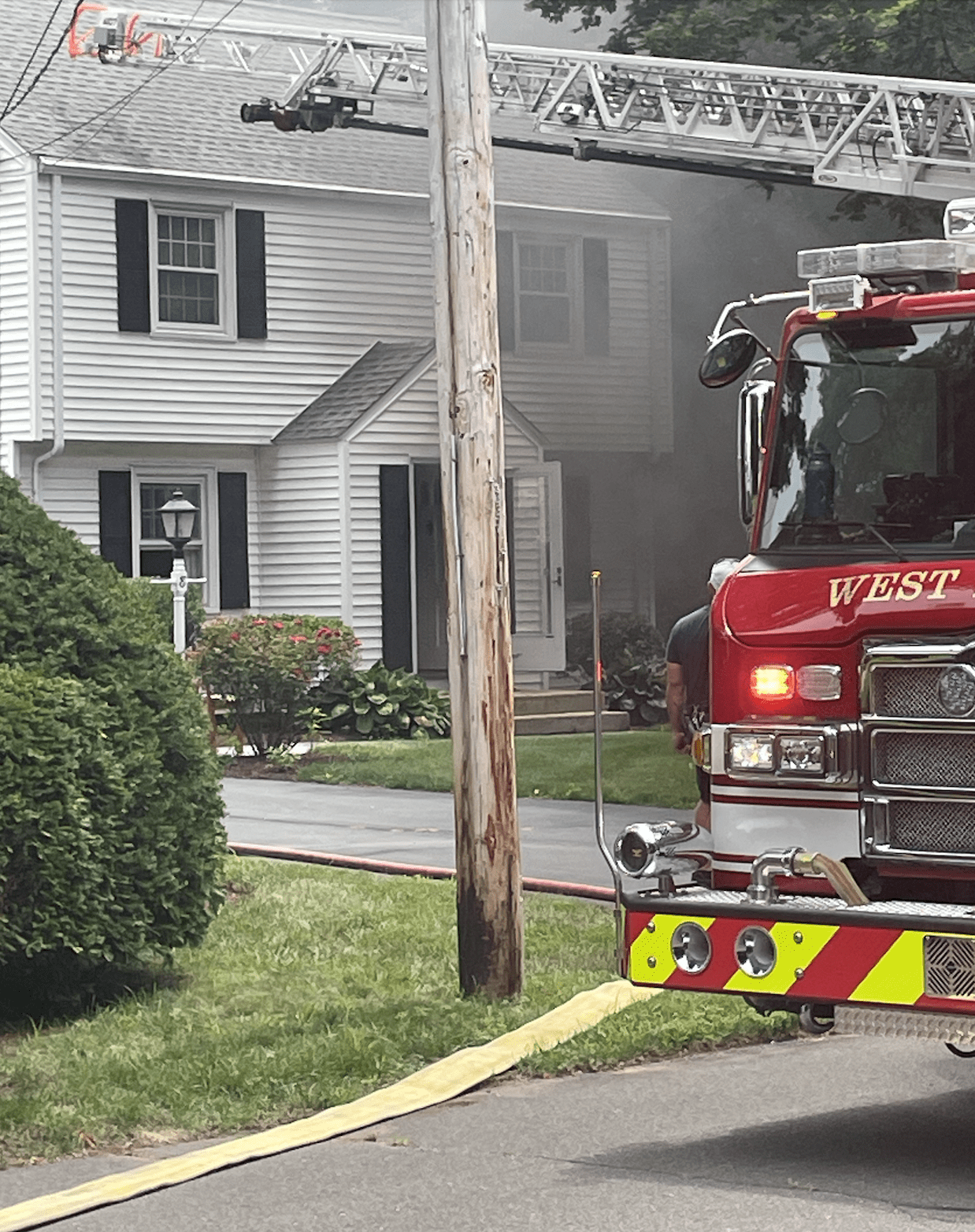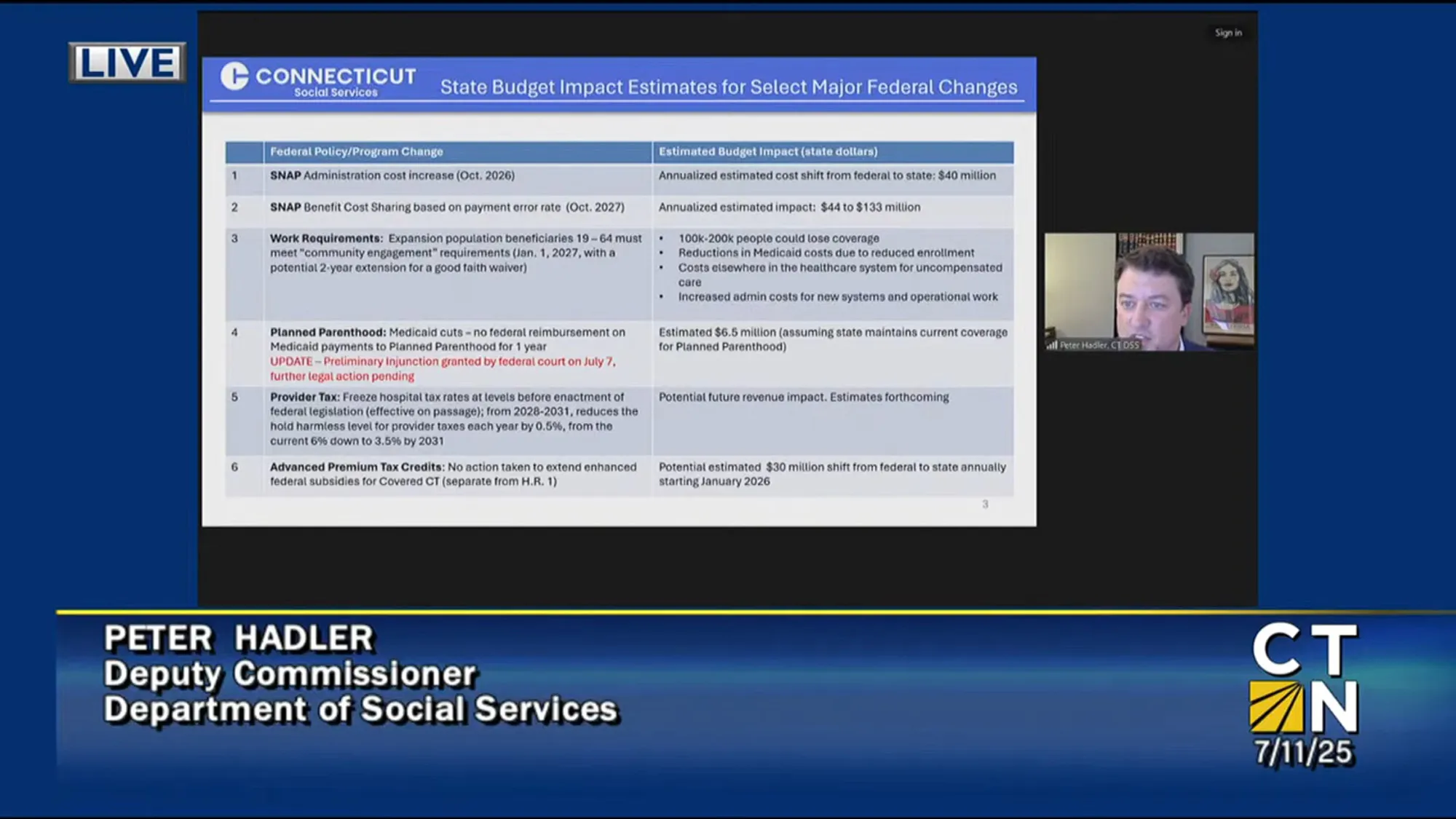Sixteen Residents Request Spending Cuts at West Hartford Town Council Budget Hearing

Audio By Carbonatix

West Hartford resident Henry Tessier (left) speaks to the Town Council at the April 11 budget hearing. Photo credit: Ronni Newton
The West Hartford Town Council held a hearing on the proposed 2018-19 budget Wednesday afternoon, and the 16 residents who spoke urged the Council to reconsider tax increases and offered some suggestions.
By Ronni Newton
Unlike the budget hearing held at 6 p.m. last Wednesday where only two residents spoke, this week more than two dozen attended a 2 p.m. hearing, the second and final hearing that will be held this budget season, and 16 spoke, requesting that the West Hartford Town Council find some way to reduce the town manager’s proposed $288.3 million budget for 2018-19.
Included among among the speakers was Waterside Lane resident George Kennedy, who said,“I’m the hibernating president of the West Hartford Taxpayers Association that has been forced out of hibernation.” Kennedy said the organization needs to be resurrected, and after the hearing he told We-Ha.com that he plans on doing so if he can get people to assist and attend meetings.
“Present taxes hurt everybody, but especially seniors,” said Kennedy, who lives in a home his family has owned since 1947. He said that West Hartford’s taxes are “absurd and unsustainable.” Seniors pay the full amount of taxes but usually almost no resources while the kids who benefit from the services graduate and leave town, and many people are stating on social media that they are probably going to need to move out of town because they can’t afford it.
Kennedy said the roads are crumbling, the education system is “bloated” and continuing to add staff despite declining enrollment. He said that getting the response of “you tell me what to cut” is “appalling,” and that should be the job of the Town Council.
“My opinion and that of many others is that the budget process is a rubber stamp,” said Kennedy, with no real challenges. His suggestions: “Establish a financial advisory committee to advise the Council and ease the burden of those decisions … establish an automatic budget referendum so people can be involved … review and consolidate programs … identify more town functions that can be regionally performed. And finally, just spend less,” said Kennedy, whose remarks were followed by applause from the audience.
Henry Tessier, the first to speak, said that most of the people who attended the hearing were retired and need some relief from an increasing tax burden.
Other speakers included Teresa Burger, who said she has lived in West Hartford for 35 years and doesn’t want to move, but said it’s no longer an affordable place to live due to tax increases that are “unsustainable for many of us.” Now is the time for the town “to find ways to reign in our spending … there’s got to be ways to help people,” she said.
Cynthia Pavey also said the yearly tax increases are unsustainable, and that tax money is being “squandered on things like granite paving” that costs millions. “West Hartford is no longer the town that cares,” she said.
Janice Ciraulo, a retired nurse practitioner, said she knows that there are fixed costs, like bonding and unfunded pension liabilities, but said perhaps there could be some savings with the retiree health plan.
“I absolutely know that one of the driving costs is the MDC and the ad valorem,” said Judy Allen. She said she hopes there can be some way to save through sharing services with other town, and thanked the Town Council for its hard work.
“I got to tell you we’ve got to cut costs. We’ve gotta cut costs all the way around,” said resident Terry Conlon, who noted that contractors from utility companies end up making the town spend more money because they tear up the roads and leave the town to do the repair work at its expense.
“It’s not just a revenue problem it’s a spend problem … no matter where you cut someone’s not going to be happy,” Conlon added.
John Souza, a resident who also owns and manages rental property, much of which is affordable housing, said that last year’s revaluation combined with tax increases has created a tremendous burden. The tax associated with some of his units increased by as much as $65 per month each, but he can’t pass all of that along to the renters. “It’s serious money,” Souza said. “We need to remember that there are people in town who live on fixed incomes. … We can absorb some of it but we can’t afford it forever.”
Resident Ed Gales suggested outsourcing janitorial services and cafeteria services as a potential cost saving measure. He said that’s what other towns such as Avon, Farmington, and Southington have done.
Job descriptions for town employees should include determining areas where processes can be improved and cost savings can be found, suggested resident Robert Rau. “If you don’t have those indices you don’t know if you’re efficient at all,” he said. “We’re too dependent on asking for more money, more money, more money every year.”
Robert Radin called the future impact of exponentially increasing tax burdens “grand theft domicile.” He also suggested a “user fee,” a separate municipal tax and a school tax so that those who use services are the ones paying for them. “I know that’s radical and its onerous to a lot of people,” said Radin, drawing applause from the crowd of mostly seniors.
The hearing lasted about an hour, and was attended by Mayor Shari Cantor, Minority Leader Chris Barnes, and councilors Leon Davidoff, Ben Wenograd, and Chris Williams.
Town Manger Matt Hart’s proposed $288.3 million budget includes a uniform mill rate of 41.54 for real and personal property as well as automobiles.
Included in the town manager’s proposed budget is the $164,551,527 education budget proposed by Superintendent Tom Moore to the Board of Education on March 6 and adopted on April 3. That budget includes $4,693,773 (2.94 percent) in additional spending for FY2019. Salaries as well as the cost of special education and transportation are some of the primary costs driving the education budget increase.
Funding for education is approximately 57 percent of the town’s budget. The most significant cost driver on the town side is an actuarially-determined increase of $2.3 million for employer contributions (ADEC) to the pension fund. Another significant increase is $1,732,862 that will be set aside to cover unsettled labor contracts since all of the town’s collective bargaining agreements are coming up for renewal and are under discussion right now.
In addition, the Metropolitan District Commission (MDC) is increasing the town’s ad valorem tax for wastewater service by just over $1 million, or 10.8 percent.
Although an apples-to-apples comparison is difficult to calculate because the mill rate for real and personal property has been split, according to Hart’s analysis, the average homeowner with two vehicles will see taxes increase by $284, or 2.91 percent, (from $9,769 to $10,053) for FY2019. In West Hartford, the “average” homeowner has a home assessed at $224,000, and two vehicles assessed at $9,000 each.
The Town Council will continue to review the budget in advance of the scheduled adoption date of April 24, 2018. While the Town Council can vote to decrease the Board of Education’s overall budget, it cannot make line-item cuts.
Like what you see here? Click here to subscribe to We-Ha’s newsletter so you’ll always be in the know about what’s happening in West Hartford!




Make that 17 people.
Median household income in WH is $92k. Property tax is a big chunk of that and grows faster than the income.
I couldn’t make it because of the hour. I do plan on sending a letter by email.
[…] the first hearing, on April 4, only two residents spoke and requested modification to the budget. Sixteen residents spoke at an April 11 hearing, requesting spending […]